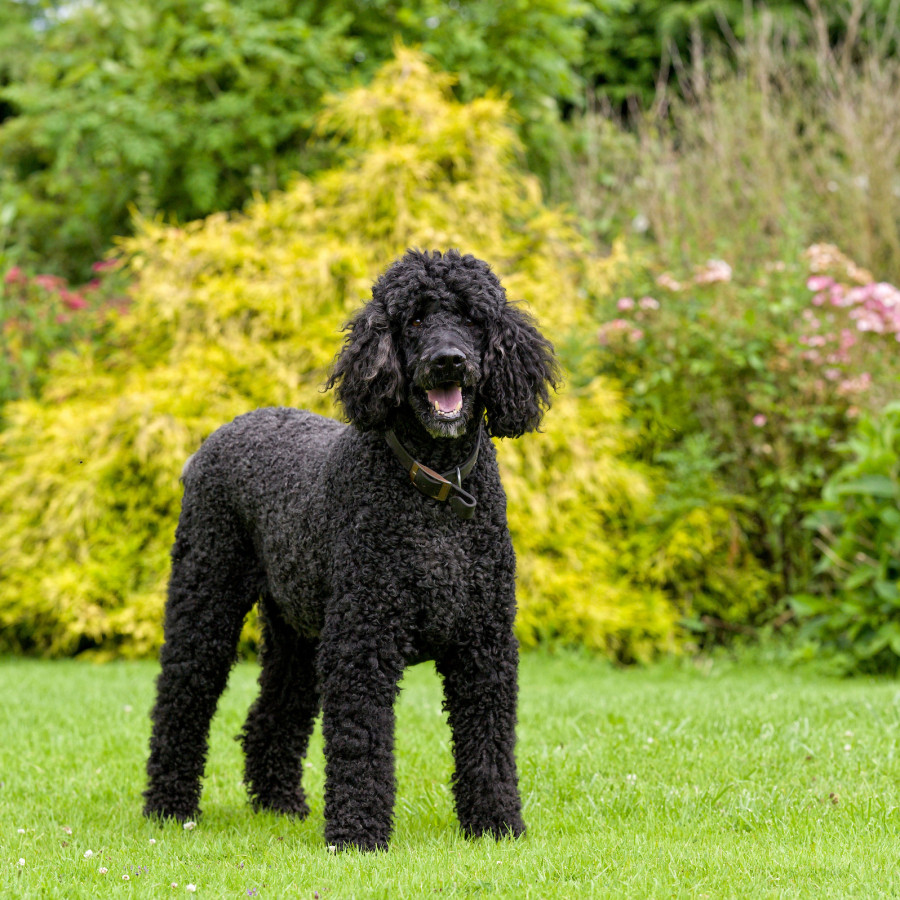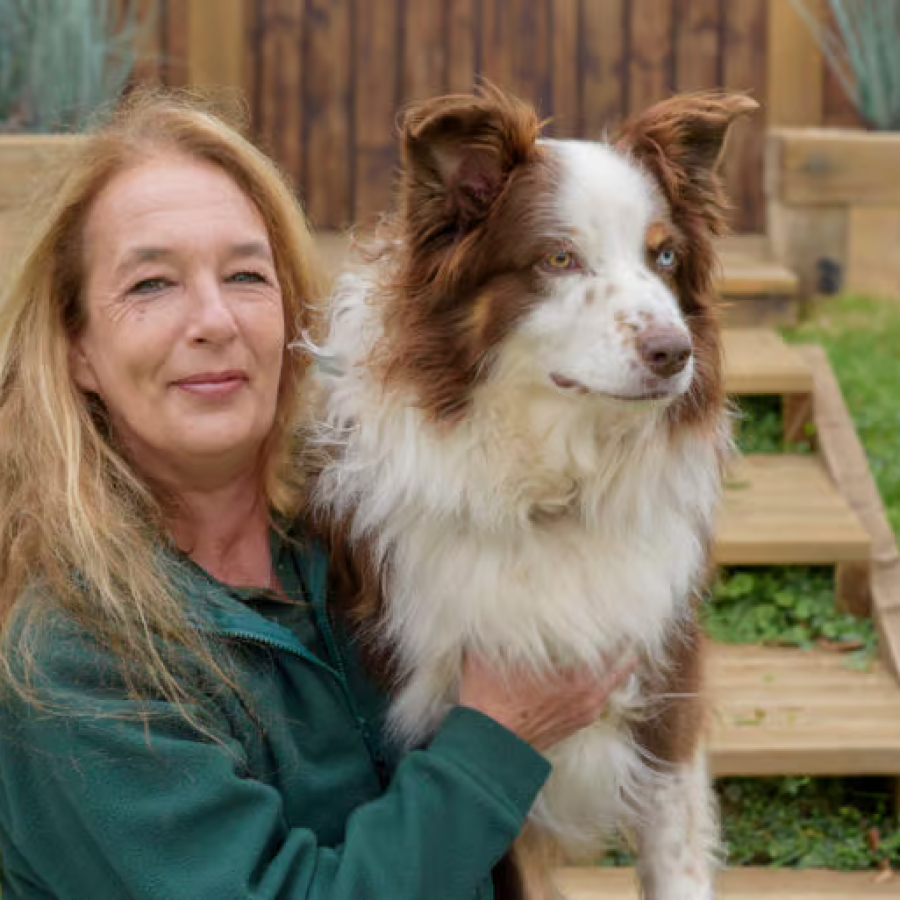
(Standard) Poodle Dog Breed
Poodles are a brainy, loving breed with oodles of energy to burn.

Poodles are a brainy, loving breed with oodles of energy to burn.
Standard Poodles are beautiful, confident, and versatile dogs, known for their low-shedding coats and sharp minds.
They’re smart, social, and super trainable – perfect for active and outgoing people. They thrive on attention and need regular grooming and brain games to keep them happy.
The Standard is the largest of three sizes of Poodle, with the Miniature being medium-sized and the Toy being the smallest.
Poodles are known for being one of the smartest breeds in the world, and with good reason. They were originally bred to work with hunters. They’re quick learners, and their eagerness to please makes training a breeze.
The traditional pom-pom style Poodle haircut can put some people off. But don’t let it fool you into thinking they’re just pretty!
They’re super intelligent, affectionate, fun-loving, and outgoing, making them charming (and sometimes cheeky!) dogs to live with – ideal for most families and first-time dog owners.
Standard Poodles are lively and need to exercise their big brains to stay happy. Without enough to do, they might get creative in ways you won’t enjoy… like ‘redecorating’ your shoes.
They’re also incredibly loyal and affectionate and bond closely with their families. They can be little shadows, following their humans around the house.
Poodles are a popular choice for crossbreeds. But you can’t guarantee which traits a crossbreed will inherit from which parent. If you want to be sure your dog has specific Poodle characteristics, it might be best to opt for a purebred Poodle!
Disclaimer
While these breed traits give a general idea of what to expect from a specific type of dog, it's important to remember that every dog is unique. Just like people, each dog comes with their own distinct personality, quirks, and characteristics!

Any dog can show behavioural problems if they don’t get what they need. This includes the right training, becoming used to people and animals, enough exercise, and the chance to use their brains.
Poodles are no exception. Having such quick minds, they can get bored easily, so they need plenty of physical and mental exercise to avoid them making their own mischievous fun.
This breed is very social, outgoing, and loyal. They bond strongly to their favourite people and so they can get anxious or destructive if left alone for long periods.
They might also show you they don’t like being away from their humans with behaviours like excessive barking, chewing, or digging.
Poodles are natural retrievers; they like to pick up and hold things and can be prone to chasing small animals like squirrels and rabbits. Sometimes they grab household items you’d rather they didn’t, like your socks or tea towels!
They can also get defensive around their things if they feel insecure or threatened – for instance, if their favourite items are always taken away.
Lastly, Poodles sometimes don’t like being groomed or touched. This is especially true if they’ve had a bad experience like a very intense grooming session or brushing through lots of tangles.
Standard Poodles are active dogs. Regular exercise keeps them happy, healthy, and out of mischief! They need daily walks, but they also love to run, play fetch, and have a go at activities like swimming, hiking, and agility training.
Did you know the word Poodle comes from the German word that means “to splash about”? This is because they were bred to jump into the water and swim to pick up animals like ducks! So, they tend to enjoy being in water and are quite athletic.
Poodles are ready to adapt to what goes on around them. Whatever exercise you enjoy, they’ll probably be excited to do it with you! They’re also a great choice for anyone considering dog sports.
Remember to exercise your Poodle’s brain, too. They’re one of the smartest breeds in the world and need puzzle toys, interactive games, and regular training sessions to keep them entertained. If they get bored, they’ll start to show behaviours you may not like.
All puppies need to learn how to be around people, pets, and other dogs, calmly and politely (known as socialisation). They also need help to feel calm, comfortable, and confident in everyday situations like travelling, the sound of traffic, and being in busy places (known as habituation). This is essential to prevent tricky behavioural problems in the future, and you'll be off to a great start with your ongoing training.
This brainy breed loves to please, making them quite easy to train. They quickly pick up on commands and enjoy learning new tricks.
However, they can also be a bit “too clever” and work out creative ways to make their own fun, so it’s important to stay consistent with training.
All dogs need reward-based training and guidance on how to interact with other dogs, animals, and people. Otherwise, they develop unwanted behaviours.
This shouldn’t stop at puppyhood, either. As dogs mature, they go through several life stages that can change their behaviour and mean you need to re-focus their training. We can help you with this through our free behaviour helpline.
Common behavioural issues in Poodles include:
- separation anxiety
- getting defensive of their things (resource guarding)
- jumping up
- problems being handled
- pulling on the lead
Poodles are known for their gorgeous, soft coat. It needs regular grooming to keep it at its best.
Their curly, low-shedding fur tends to be a good option for people with allergies, but it should be brushed several times a week to prevent matting. If it isn’t brushed, your dog can develop painful tangles which may need to be shaved very short to help their coat grow back healthy.
Professional grooming every four to six weeks is ideal for keeping Poodles’ coats in great shape with clipping or trimming. These adorable dogs can be groomed in a huge range of styles, from a simple pet trim to elaborate show cuts.
Regular baths, nail trimming, ear cleaning, and dental care are also important for your dog’s overall well-being. These can be done at home if you show your dog grooming is enjoyable from the start.
I love staying active! Daily walks are a must, and I also enjoy running, swimming, and playing fetch. Without enough exercise, I might get agitated, so keep me busy and we’ll both be happy.
I’m a smart cookie and need to keep my brain switched on. Puzzle toys, interactive games, and learning new tricks are my jam. Don’t let my reputation fool you – I love going for a swim and getting dirty to let my hair down!
I love learning and am always top of the class! Basic obedience is a breeze for me, but I also enjoy mastering fun tricks and agility. Just remember, I need consistent training and a positive attitude to keep my skills sharp.
You can expect to pay around £800 to £2,500 for a Poodle depending on the pedigree and breeder’s reputation.
There are other initial costs to think about, too. Bowls, a bed, a collar, a lead, toys, grooming tools, and any other equipment could cost up to a few hundred pounds overall.
Below, you can get an idea of what longer-term costs to expect:
Grooming: £30 to £80 per session every four to six weeks, depending on size and coat style.
Food: £20 to £50 per month, depending on size and diet.
Pet insurance: £20 to £50 per month, depending on coverage.
Vet bills: £100 to £500 annually for routine vaccinations and check-ups.
Training classes: £50 to £150 for basic obedience, with additional classes for advanced training.
Dog walker/boarding: £10 to £25 per walk, or £20 to £50 per day for boarding, if needed.
Take our quiz to discover which breed is right for you
Take our quizPlease call our pet support line on 0300 303 9333 (7 days a week – 8.30am - 4pm)